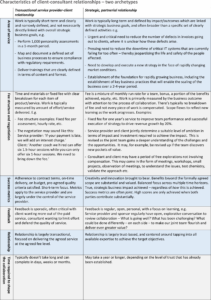What does it look like when consultants and senior leaders partner strategically? Consider these four vignettes from our recent experience.
Vignette 1: One day, a senior leader named Ben called me. I have worked with Ben for a decade, and he is someone I trust deeply. He asked if I would be open to meeting a friend of his, Alice, who is the head of L&D at a large company in Hong Kong. When I met Alice, we hit it off, and she asked me to run a 2-day workshop for a group of high-potential leaders. She asked me about the fee, and I said, “We would be happy to run this workshop for free.” She was taken aback and asked why. I told her that “We focus on shaping and delivering long-term strategic talent development programs, which often run for 1-5 years. We do not typically contract for a 2-day workshop. I enjoyed our conversation, and I sense that this workshop is important for you and your organization. Also, Ben is a good friend that I trust deeply.”
Vignette 2: I traveled to a hospitality client’s headquarters in Switzerland. I had been working with the client’s team for two weeks. On Thursday evening, the chairman, Tim, asked me, “What’s your plan for the weekend?” I said, “Well… I haven’t thought about it yet.” Tim said, “Would you fancy joining a tour we are running and chasing northern lights?” Friday night, I was flown to northern Norway, where I spent two days with the team and had a great time while experiencing the organization’s service for real alongside other guests. The client simply wanted me to understand their business at an even deeper level so that our collaboration might be even more enjoyable and value-creating.
Vignette 3: I had had a dozen conversations over six months with a CEO friend named Matt, helping him think through the strategy for developing his business in Asia. One day, Matt asked if I could put together a team to help him develop his senior leadership and work with them to grow their business in Asia. He asked me to give him a monthly level fee for a 2-year period, I gave it to him, and he came back saying that it was great and offered to provide me with a 20% down payment at the start of the engagement – without even asking for it.
Vignette 4: I had been working with Nathan, a senior executive coach, for many years. Whenever I need to field a team to serve a client, he is at the top of my list. We ended up serving one client in Hong Kong in a 2-year transformation program. During that period, my wife wondered if she was ready to slow down her career and have a child. It was a hard decision for her to make, and she was confused. I shared this with Nathan, and he offered to coach my wife without charging a fee. My wife was prepared to pay and offered to do so. Nathan told her, “Tor is a dear friend and a close colleague. I would be honored and pleased to support you at no cost.” While I was grateful that Nathan was keen to do that – it was not about saving the fee; I took it as a sign of friendship.
From our experience of serving clients globally for the past three decades, these short examples of interactions with clients and collaborators are strong indicators of long-term strategic relationships. When we have such relationships, we know that we have the foundation for achieving strategic impact together – that is deeply satisfying for us as consultants, and our clients also benefit greatly from such a relationship.
Not every client-consultant relationship needs to be like this. It’s entirely fine to have relationships that are less personal and more transactional. Transactional relationships are likely to be more efficient in solving simple or even complicated problems with existing solutions.
However, an increasingly VUCA (Volatile, Uncertain, Complex, Ambiguous) world demands more long-term strategic relationships that will enable business leaders and consultants to work together in solving complex problems. Any relationship is a two-way street. We dedicate this article to business leaders and consultants interested in establishing long-term strategic relationships and becoming more skillful at doing so. The business leader or the consultant, him/herself, cannot single-handedly decide that they want a strategic rather than a transactional relationship. In this article, we share our experience in identifying the types of fit-for-purpose relationships – transactional or strategic. If a strategic, partnerial relationship is deemed most suitable, we provide a possible path on how the business leader and the consultant might establish such a deep, trust-based relationship.
Let us first get clarity on what we mean by a strategic, partnerial relationship. What characterizes such a relationship? The table below articulates these characteristics by contrasting them with the characteristics of a transactional relationship.
If you are curious to learn more about how to build strategic, partnerial client-consultant relationships, please read Part 2 of this article focusing on how you can build a successful strategic client-consultant relationship.
—
Tor Mesoy is the Managing Director of Agnus Consulting, a Hong Kong based firm that delivers strategic consulting services, leadership development, and executive coaching to clients around the world.
Tor has served as a management consultant and leadership development consultant for more 30 years. He was a partner with McKinsey and, before that, a partner with Accenture.
He has led a number of large transformation programs and played key roles in several mergers/acquisitions. He has served clients in all parts of the world including Asia (Hong Kong, Beijing, Shanghai, Singapore, Kobe, Djakarta, Kuala Lumpur, …), America (New York, San Francisco, San Jose, Chicago, Minneapolis, Raleigh, …) and Europe (Paris, London, Edinburgh, Scandinavia). Tor has also led leadership development programs around the world – providing leadership development to more than 4,000 leaders through these programs, and he has lectured on leadership-related topics at several leading academic institutions including University of Oxford, Carnegie Mellon University, and the Norwegian University of Technology and Science.
Yan Liu is a senior executive coach, facilitator and consultant of Agnus Consulting, a Hong Kong based firm that delivers strategic consulting services, leadership development, and executive coaching to clients around the world.
She has over 15 years’ experience in leading teams, managing projects, and designing and delivering organization development programs. Her passion is to facilitate individuals and teams to become more effective at collaborating to solve critical problems and creating sustained, step-wise improvements in performance impact. She has worked with corporations, universities, NGOs and start-ups in mainland China, Hong Kong, Macau, Singapore, Malaysia, Thailand, and Europe. She has led or contributed to multiple large transformation programs, primarily in Asia.






